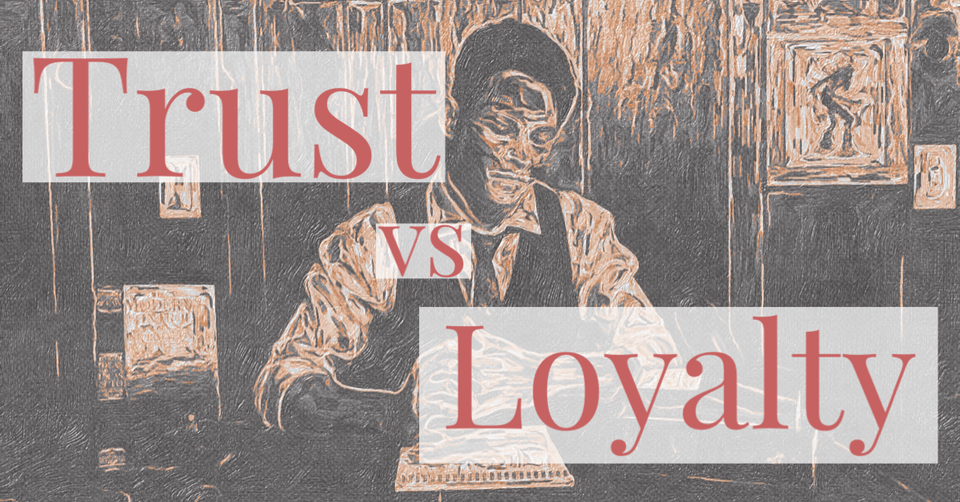The Misconceptions of Trust and Loyalty

In a time and place of publicly-owned government, where the government official is a steward of the government apparatus,* the fundamentals of business is meddled** with to the point where many people no longer have a practical understanding of trust and loyalty. This is not to say that people are no longer trustworthy nor loyal. On the contrary, the vast majority of people are trustworthy because the free exchange requires trust. Loyalty, on the other hand, is more complicated and often the term is wielded in manipulative fashion.
Trust is faith that another will uphold his end of a bargain, be it an implicit or explicit bargain. Contrary to what many statists might claim, trust increases in society.
As a society's economy innovates, more diversity of jobs and more prosperity (availability of goods) results. As such, as an economy advances, a person participates in more exchanges than his predecessors did.
An exchange of services or goods requires that at least one party trusts the other. We must trust that the other party will pay or will provide the promised service. We must trust that we will not be defrauded, even more so in a more populated, advanced economy because we exchange with strangers more often than in a smaller, simpler economy. In light of this deduction, it would be foolish to claim that people or "society" is somehow becoming less trustworthy. If anything, this trend may indicate that people are becoming more trusting of one another and becoming more trustworthy themselves (of course, as government becomes larger, more theft and violence and the antithesis of trust occurs, though I am limiting my deductions to the economy rather than the state). Trust occurs between employer and employee when one pays the other after the labor or services were provided. The employee trusts that the employer will pay him, and the employer almost always does because it is in his interests to do so. This is why Mises and Rothbard have often claimed that the free exchange is precisely the relationship that allows men to benefit other men while also satisfying their own needs. This form or reciprocity is built on inherent trust.
As for loyalty, defining the term is not so simple. If Gertrude hires Ichabod as a marketing agent, she risked being defrauded and needed to trust that he would honor his obligations to her as agreed upon. If another produces the same results at the same price as Ichabod, Gertrude will likely still hire Ichabod since she already risked doing business with him once; since she and him have established trust. A competitor would have to (i) produce results that are worth more than Gertrude's [marginal] subjective valuation of established trust plus whatever value Ichabod's services were worth, or (ii) offer a price that is lower than the difference of Ichabod's services minus Gertrude's [marginal] subjective valuation of established trust.
If a competitor does meet one or a combination of the two criteria, he can convince Gertrude to hire him instead of Ichabod.
But what if Ichabod makes an appeal to "loyalty" in this scenario? What if he appeals to this argument without following the principles of competition (innovating to decrease his prices or innovating to increase his product's value)? This is an interesting blend of economics and ethics. If Ichabod appeals to loyalty to keep his client, and succeeds in doing so, then his client is worse for it - she will have to pay more for a service that may be less valuable.
Let us examine the employer and employee relationship. Perhaps an employee can receive higher pay from another employer, but his current employer argues that "ours is still a new company with the potential for growth and future promotions". In this case, the current employer may also appeal to loyalty, but it would not be in isolation because the employee would also have to consider the value of increased wages now versus the value of potential promotions later. An isolated appeal to loyalty was not required since a legitimate argument (or promise) was presented.
Another example would be a family-run business where a restless nephew considers work elsewhere but also has to consider that he has a higher stake in the family business than he would in a stranger's business. Furthermore, people value all manner of things, such as relationships. A business may keep an employee at wages less than the employee is worth to other employers if that employee values his relationships at the current business more than the increase in wages he could have elsewhere. All of this is to say that valuation is complex, but by itself, isolated appeals to loyalty in business are manipulative at best and harmful at worst.
If an employer manages to keep disgruntled employees from leaving by crying out "what about loyalty?!" then the employer will be less competitive for it. It would be better for all parties involved if the employer chooses competition over manipulation (shame). The same holds for all exchanges. As long as an individual or business continues to innovate and succeeds in satisfying demand, they do not need to attempt to force obligations where obligations ought to not belong. That is what an isolated appeal to loyalty is, after all - an attempt to force an obligation onto a person where an obligation ought to not belong, which is one of the two forms of villainy***.
In personal relationships, including business relationships where two parties are familiar with one another, if one party cannot present an argument other than the loyalty appeal, then that is just the party that needs to reevaluate what it is lacking. Loyalty does have additional complications in personal relationships due to undeniable (though comically controversial) gender differences, though this is an emotional topic for many even if politically-born gender issues didn't exist.
In Personal Relationships
Stay tuned.
* As opposed to a privately-owned government apparatus, where the government official is the monarchist or his lackeys. In this scenario, government obeys all of the same anti-market behaviors as the publicly-owned government, or The Democracy. Both are insulated from reciprocity and as such cannot do what the market does as competently. Both are insulated from the principle of marginal utility and thus will be more wasteful than their market analogs (most pollution is caused by direct action of government, rather than "the corporations"). However, since the steward in the democracy is a temporary position, he must wield the government apparatus now, in nefarious ways, in order to benefit his interests. As such, the steward of the publicly-owned government has lower time preferences than the monarchist of the privately-owned government. This is precisely why the former degrades faster than the latter.
** If business is free exchange, and if government is [organized] theft and force, then the two are opposites. For the government official to continue to benefit from his privileged position of receiving resources without earning them, he must degrade language, censor libertarians and capitalists, and he must emphasize his own voice with his advantage of organized coercion. Thus, if the free exchange requires trust, he will meddle with the meaning of the word until it become incomprehensible. As for loyalty, he will wield it as an instrument of subservience, shaming those of whom would otherwise avoid his "services".
*** Villainous behavior is classified as one of the two extremes of the moral dichotomy where a person either abandons his obligations (Johnny Ringo or The Joker) or forces obligations where they ought to not belong (Professor Umbridge or the entitled-ex-that-will-not-let-you-be).

Member discussion